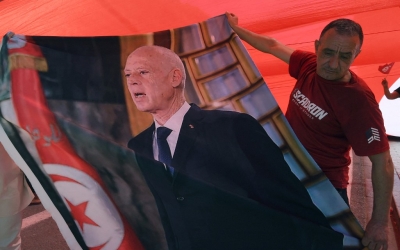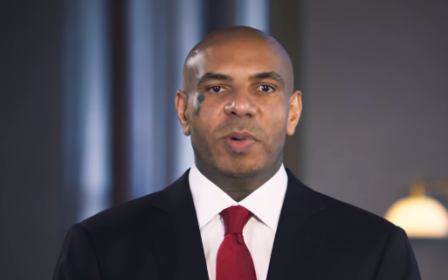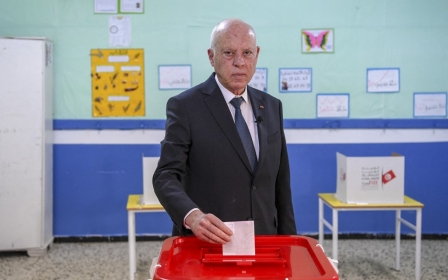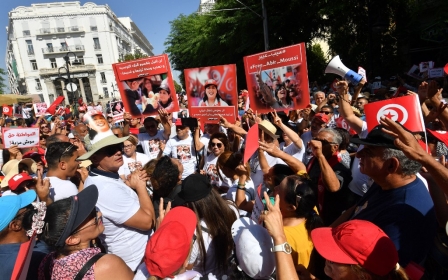Tunisia election: Electoral body accused of supporting president by excluding rivals
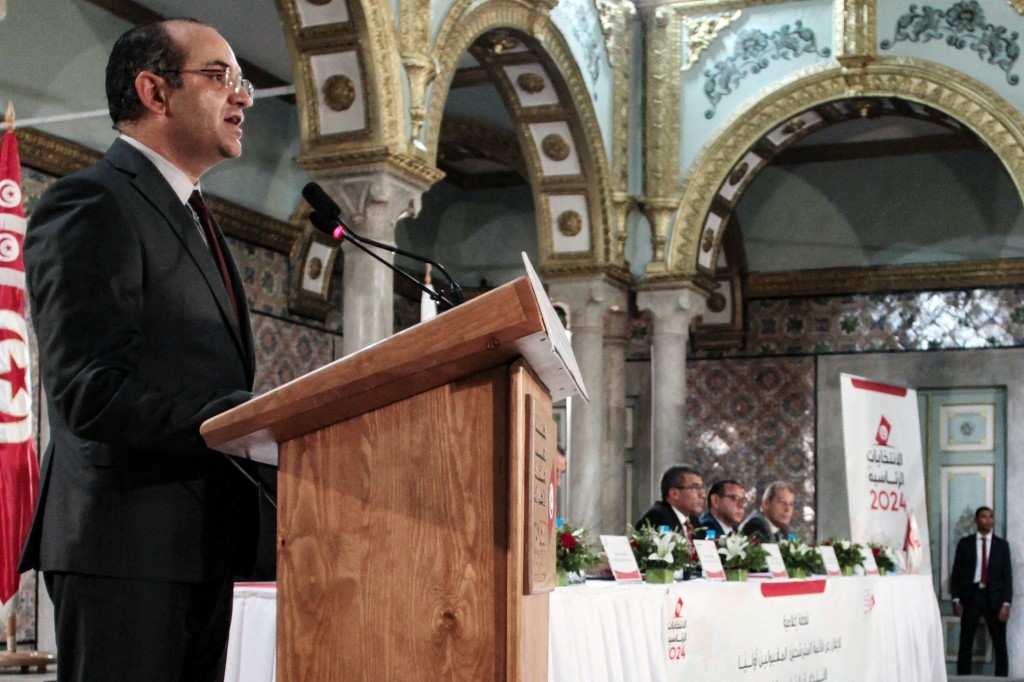
When Tunisia's administrative court last week accepted the appeals of three candidates disqualified from running in the presidential election, surprise turned into hope that the polls would be genuinely competitive.
Yet on Monday, Tunisia's electoral authority announced it would let just three candidates - including President Kais Saied - put their names on the ballots.
The disqualified contenders who had been readmitted to the electoral race by the court were seen as serious competitors for Saied: Abdellatif Mekki, a former leader of the "democratic Islamic" Ennahda party, Mondher Zenaidi, a minister under former autocrat Zine el-Abedine Ben Ali, and Imed Daimi, an adviser to former President Moncef Marzouki, also close to Ennahda.
To justify the exclusion of the three candidates, the head of the Independent High Authority for Elections (Isie), Farouk Bouasker, said that "the administrative court had not officially communicated its decisions [to the electoral body] within the 48-hour period as required by the law".
He added that the initial list announced by the Isie on 10 August was "final and not subject to any appeal", thereby ignoring the ruling of the administrative court, which is regarded by some jurists as the highest jurisdiction in the country.
New MEE newsletter: Jerusalem Dispatch
Sign up to get the latest insights and analysis on Israel-Palestine, alongside Turkey Unpacked and other MEE newsletters
Isie’s decision sparked outcry, as legal experts had insisted in recent days that the rulings of the administrative court were final and irrevocable, and has also rekindled criticism of a body accused of being influenced by the government in power.
Daimi denounced the announcement as a "big farce", adding that he did not recognise the decision and promising that he would "continue the fight".
Zenaidi's legal team, meanwhile, declared its rejection of "this illegal decision", announcing it would appeal. The candidate’s lawyers insisted that there were no legal proceedings preventing him from running for the presidential elections.
'Following its decision today, the election commission has lost its independence and issued an arbitrary political decision'
- Mondher Zenaidi legal team
"Following its decision today, the election commission has lost its independence and issued an arbitrary political decision", which "constitutes a dangerous precedent that undermines the rule of law and institutions and threatens civil peace", his legal team said.
On Saturday, 26 Tunisian and international NGOs and nearly 200 prominent figures, including many lawyers, called on Isie to respect the decisions of the administrative court, stressing that these were "enforceable and could not be contested".
In a petition, they urged the electoral body to "avoid any practice that could undermine the transparency and integrity of the electoral process".
On Monday morning, a demonstration was organised by several political parties and NGOs in front of Isie's headquarters to put pressure on the electoral body for it to respect the decisions of the court.
La 20e de manifestants devant l'isie ecoutant en direct le discours de Bouasker sur le noms des candidats à la presidentielle #tunisie pic.twitter.com/kGi3SyESVZ
— Mathieu Galtier (@mathieu_galtier) September 2, 2024
Translation: "The 20 or so demonstrators in front of the Isie listening live to Bouasker's speech on the names of the presidential candidates #Tunisia."
"We know that this body is neither independent nor objective in what it does," Sana Ghenima, president of the association Femme et Leadership, who was attending the demonstration, said when the decision of the Isie was made public. "It places itself above the law."
Hichem Ajbouni, a former MP and member of the centre-left Democratic Current party, added: "We live in a state where the laws no longer apply and this is really worrying for the presidential election, which risks being more of a sham than anything else."
Similarly, the indepndent political website Kapitalis denounced the Isie as dismissing the court's decision "with a wave of the hand".
"This is a precedent in the history of the Isie and in that of the administrative court that calls into question the relations and balances between the institutions of the state. The electoral commission is now above the jurisdictions of the country, including the administrative jurisdiction," it wrote.
Some Tunisians took to social media to express their anger.
Prominent cartoonist Tawfiq Omran posted a drawing that depicted the Isie in a cage, insinuating it was lacking independence.
INDÉPENDANCE #tunisie🇹🇳 #isie #election2024 #independent pic.twitter.com/yRf3UclvIC
— Omrane Cartoons (@OmranCartoonist) August 31, 2024
"A dark day in the history of Tunisia," one Tunisian expatriate lawyer posted on X.
"The Isie has emptied the work of the judiciary of its essence and has deprived the presidential election of any interest. The boycott is becoming essential. This is the only way to denounce this masquerade and remove all legitimacy from Saied."
Je ne reconnais pas les décisions de L'ISIE. #Tunisie pic.twitter.com/3nA4scwTG9
— Gargabil (@Gargabil) September 2, 2024
Translation: "I do not recognise the decisions of the Isie. #Tunisia."
'Completely controlled'
Isie was created in 2011 in an effort to take the responsibility for organising elections away from the interior ministry.
According to political analyst Hatem Nafti, it was hoped that the method used to select its appointments would guarantee its independence: officials are elected by a two-thirds parliamentary majority.
But since Saied’s coup in August 2021, during which he granted himself full powers before reforming the constitution to establish an ultra-presidential system, the members of the electoral authority have been directly or indirectly chosen by the president.
The current composition of the seven-member Isie is also unconstitutional, according to the Basic Law of 2022 promoted by the president himself, which requires the body to be made up of nine officials.
"The so-called independent electoral authority is an authority that lost all independence after Saied's coup d'etat," Vincent Geisser, senior researcher at the Institute of Research and Study on the Arab and Islamic Worlds (Iremam), explained on French radio RFI.
'Contrary to what its name suggests [the Isie] is not independent'
- Hamza Meddeb, political scientist
"It is completely controlled, swallowed up and locked down today by the executive and more precisely by the president, while the chairmen of this body are directly chosen by the president of the republic."
For political scientist Hamza Meddeb, "the Isie’s legitimacy has been tarnished for a long time, as shown by its composition, the appointments by the president, the way in which it has granted itself the right to do without the parliament and to interpret the laws in its own way".
"Contrary to what its name suggests," he told Jeune Afrique, the Isie "is not independent".
With the Isie’s decision, the presidential election has no legitimacy and becomes “a simple plebiscite without foundation”, Meddeb added.
Similarly, Nafti told MEE that the Isie head Bouasker's justifications held no water, saying that the body had multiplied the pretexts to have the administrative court’s decision annulled, even going so far as to insinuate that certain judges were "politicised".
"An unconstitutional body, even in light of Saied’s constitution, appointed by the president, acts for the person who appointed it - and pursues all those who underline this point," he said.
Administrative obstacles
The initial selection of presidential contenders had already been widely criticised. Experts and candidates deplored the difficulty people faced gathering the necessary sponsor signatures, as well as other administrative obstacles.
Human Rights Watch also denounced the imprisonment or prosecution of "at least eight candidates", which de facto prevented them from running.
In the end, the incumbent will face only two candidates: Ayachi Zammel, an industrialist, former MP and leader of a small and little-known party; and Zouhair Maghzaoui, another former lawmaker and leader of the People's Movement, a party of the pan-Arab left, who supported Saied's coup in 2021.
On Monday, Zammel was arrested at dawn on suspicion of "falsifying sponsor signatures" to file his candidacy, and placed in police custody.
"The candidates who could represent an obstacle for Saied have been removed. We now have a candidate from within the regime and another in prison," Nafti noted.
"This reinforces the impression of locked elections. Saied has a boulevard in front of him. And the decision of the Isie proves that there is no longer any rule of law."
For Isabelle Werenfels, political scientist at the German Institute for International and Security Affairs (SWP), "we can say that the Isie has practically decided the outcome of the vote".
She believes that the unexpected readmission of candidates by the administrative court reflects "frictions within the elites between pro- and anti-Saied, which could be positive for what remains of democracy in Tunisia".
However, these tensions could be "problematic, even dangerous because if the president feels challenged, he could become even more authoritarian", she told AFP.
While the electoral campaign is expected to begin on 14 September, France 24 reported that many Tunisians are talking about organising a form of resistance through a coalition that would bring together political parties and civil society.
Middle East Eye delivers independent and unrivalled coverage and analysis of the Middle East, North Africa and beyond. To learn more about republishing this content and the associated fees, please fill out this form. More about MEE can be found here.


